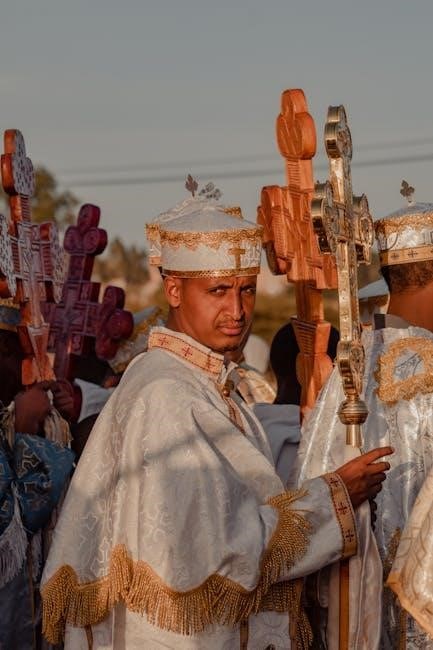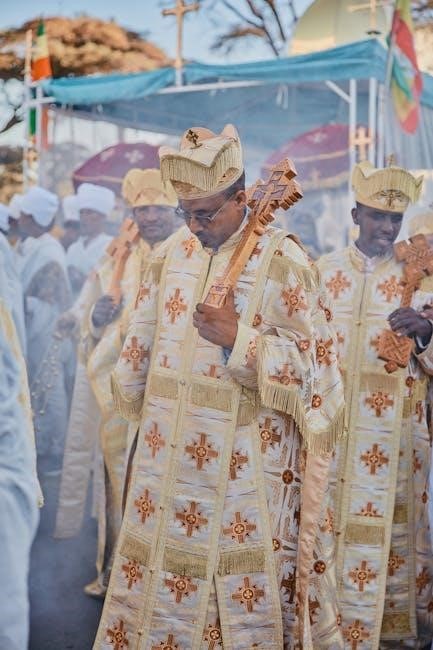ethiopian orthodox fasting calendar 2023 pdf

The Ethiopian Orthodox fasting calendar 2023 outlines a profound spiritual journey, blending tradition and devotion. It includes over 180 mandatory fasting days, guiding believers toward reflection and purification, while fostering community observance and deeply rooted traditions.
Overview of the Ethiopian Orthodox Tewahedo Church
The Ethiopian Orthodox Tewahedo Church, one of the oldest Christian churches, traces its origins to the 1st century AD. Established by Saint Mark, it has a rich tradition shaped by biblical teachings and unique cultural practices. The church is known for its Ge’ez liturgy and vibrant spiritual heritage, playing a central role in Ethiopian identity. With a strong emphasis on community and scripture, it has preserved ancient manuscripts and traditions, including the construction of iconic monolithic churches. Its influence extends globally, uniting millions in faith and culture, while maintaining its distinct character and historical legacy.
Significance of Fasting in the Ethiopian Orthodox Tradition
Fasting holds profound spiritual and communal significance in the Ethiopian Orthodox tradition, serving as a means of self-reflection, humility, and devotion. It is practiced to emulate the fasting of biblical figures, including Jesus Christ, and to seek spiritual purification. Fasting strengthens believers’ connection to God, fostering discipline and mindfulness. The practice is deeply rooted in scripture and church teachings, encouraging believers to detach from worldly desires and focus on prayer and charity. This communal act unites the faithful, reinforcing their shared faith and cultural identity, while fostering a deeper understanding of their spiritual journey.
Structure of the Ethiopian Orthodox Fasting Calendar
The Ethiopian Orthodox fasting calendar is structured around major periods like Great Lent and Apostles’ Fast, alongside weekly Wednesday and Friday observances, guiding spiritual discipline yearly.
Major Fasting Periods in 2023
The Ethiopian Orthodox fasting calendar for 2023 includes several major periods. The Great Lent (Abiye Tsome) began on February 27, 2023, lasting 55 days. The Apostles’ Fast started on June 12, 2023, spanning up to 40 days. The Dormition Fast commenced on August 7, 2023, lasting 15 days. Additionally, the Fast of the Prophets (Tsome Nebiyat) and other observances were noted. These periods emphasize spiritual reflection, prayer, and abstinence, with believers abstaining from meat and dairy, and attending church services. The calendar ensures a structured approach to fasting, fostering devotion and community unity throughout the year.
Key Dates and Duration of Fasts
The Ethiopian Orthodox fasting calendar for 2023 includes specific dates for major fasts. The Great Lent (Abiye Tsome) began on February 27, 2023, and lasted 55 days, concluding on April 22. The Apostles’ Fast started on June 12 and continued for 10 to 40 days, ending on July 10; The Dormition Fast commenced on August 7 and lasted 15 days, ending on August 22. These periods are central to the spiritual practice, emphasizing prayer, reflection, and abstinence from certain foods. The structured timeline ensures clarity for believers to observe these sacred traditions faithfully.
Major Fasting Periods in the Ethiopian Orthodox Church
The Ethiopian Orthodox Church observes several major fasting periods, including the Great Lent, Apostles’ Fast, Prophets’ Fast, and Dormition of Saint Mary, each with unique durations and spiritual significance.

The Great Lent (Abiye Tsome)
The Great Lent, or Abiye Tsome, is the most significant fasting period in the Ethiopian Orthodox Church, lasting 55 days. It commemorates Jesus Christ’s 40-day fast in the wilderness and includes an additional 15 days of preparation. During this time, followers abstain from meat, dairy, and eggs, consuming only one meal per day. The fast begins on a Monday and culminates in Easter, symbolizing spiritual purification and renewal. It is a period of intense prayer, reflection, and charity, emphasizing the triumph of good over evil and the resurrection of Christ;
The Fast of the Apostles (Tsome Hawariyat)
The Fast of the Apostles, or Tsome Hawariyat, is a significant fasting period in the Ethiopian Orthodox Church, lasting between 10 to 40 days. It begins after the Feast of Pentecost and commemorates the apostles’ fasting following the descent of the Holy Spirit. This fast is a time of prayer, reflection, and spiritual renewal, preparing believers for the Feast of St. Peter and St. Paul. Adherents abstain from meat and dairy, consuming only one meal per day, emphasizing humility and devotion. It is a period of deep spiritual preparation and connection to the apostolic traditions of the early Christian Church.
The Fast of the Prophets (Tsome Nebiyat)
The Fast of the Prophets, or Tsome Nebiyat, is a 43-day fasting period in the Ethiopian Orthodox Church, typically observed in late November and December. It honors the prophets of the Old Testament who prepared the way for the coming of Christ. During this fast, believers abstain from meat and dairy products, consuming only one meal per day. Tsome Nebiyat is a time of spiritual reflection, prayer, and preparation for the Nativity of Christ, emphasizing humility and devotion. It is one of the seven major fasts in the Ethiopian Orthodox tradition, deeply rooted in biblical heritage and faith.
The Dormition of Saint Mary Fast
The Dormition of Saint Mary Fast, observed by the Ethiopian Orthodox Church, is a 14-day fasting period preceding the Feast of the Assumption of the Virgin Mary. It commemorates the Mother of Christ’s bodily ascent to heaven, emphasizing her divine role in salvation. During this fast, believers abstain from meat and dairy, engaging in heightened prayer and reflection. The fast culminates on August 22 (in the Ethiopian calendar), celebrating Mary’s dormition and intercession; This period is a vital part of the Church’s liturgical year, fostering spiritual renewal and veneration for the Virgin Mary.

Additional Fasting Practices
Beyond major fasting periods, Ethiopian Orthodox followers observe weekly fasts on Wednesdays and Fridays, known as Tsome Dihinet, and may engage in optional devotional fasts throughout the year.
Weekly Fasting on Wednesdays and Fridays (Tsome Dihinet)
Tsome Dihinet, or the Wednesday-Friday fast, is a longstanding practice in the Ethiopian Orthodox tradition. Believers abstain from meat and dairy products on these days, typically consuming one meal after prayer. This practice, observed throughout the year except during certain feast periods, fosters spiritual discipline and reflection. It commemorates significant events: Wednesday for Jesus’ betrayal and Friday for His crucifixion. While optional for some, it is highly recommended for spiritual growth, reinforcing the community’s shared commitment to faith and self-control; This weekly observance complements the church’s broader fasting traditions, emphasizing consistency and devotion in daily life.
Other Optional Fasts and Observances
Beyond the mandatory fasts, the Ethiopian Orthodox Church recognizes optional observances that deepen spiritual devotion. These include local or personal fasts honoring specific saints or events, such as the Fast of the Prophets (Tsome Nebiyat) and the Dormition of Saint Mary. While not required, these practices are encouraged for those seeking heightened spiritual growth. They vary in duration and observance, often reflecting individual or communal needs. Such optional fasts enrich the believer’s connection to faith, complementing the structured fasting calendar and fostering a culture of prayer and reflection beyond the obligatory periods.

Rules and Guidelines for Fasting
The Ethiopian Orthodox fasting rules are strict, prohibiting meat, dairy, and oils. Believers abstain from food until sunset, with one meal allowed, emphasizing prayer and reflection.
Dietary Restrictions and Spiritual Practices
The Ethiopian Orthodox fasting calendar 2023 imposes strict dietary rules, prohibiting meat, dairy, and oils during fasting periods. Followers abstain from food until sunset, with only one meal permitted afterward. Spiritual practices, such as prayer, reflection, and attending church services, are emphasized to deepen devotion. The fasts aim to mirror Christ’s wilderness experience and foster self-discipline. Exceptions are made for children, the sick, and pregnant women. This rigorous regime, totaling over 180 fasting days annually, is central to the Church’s spiritual growth and communal observance, strengthening believers’ faith and connection to their heritage.
Exemptions and Special Considerations
The Ethiopian Orthodox Church allows exemptions from fasting for certain individuals, including children, pregnant women, the elderly, and the sick. Travelers or those with physical labor requirements may also receive dispensation. Clergy and spiritual leaders guide believers in applying these exceptions, ensuring fasting does not harm health. Additionally, spiritual practices like prayer and reflection are encouraged for those unable to fast, emphasizing the importance of intent and devotion over physical abstinence. These considerations highlight the Church’s compassion and adaptability while maintaining the spiritual essence of fasting traditions;
Key Dates in the 2023 Ethiopian Orthodox Fasting Calendar
The 2023 calendar includes major fasts like The Great Lent (55 days), The Fast of the Apostles (10-40 days), and The Fast of the Prophets, with Easter celebrated on May 5th.
Start and End Dates of Major Fasts
The 2023 Ethiopian Orthodox fasting calendar includes several major fasting periods. The Great Lent (Abiye Tsome) begins on March 11th and lasts for 55 days, concluding on May 5th. The Fast of the Apostles (Tsome Hawariyat) typically starts in June and varies between 10 to 40 days. The Fast of the Prophets (Tsome Nebiyat) occurs in December, lasting 43 days. Additionally, the Dormition of Saint Mary Fast starts on August 7th and ends on August 22nd. Weekly fasting on Wednesdays and Fridays is also observed throughout the year, while other optional fasts may vary based on regional traditions and church decrees.
Important Feast Days and Celebrations
The Ethiopian Orthodox Church celebrates several significant feast days. Easter, marking Christ’s resurrection, is a grand celebration following the 55-day Lent. The Feast of the Ascension honors Jesus’ ascent to heaven, occurring 40 days after Easter. The Dormition of Saint Mary, on August 22nd, is deeply revered, commemorating the Virgin Mary’s dormition. Additionally, Meskel, the Finding of the True Cross, is celebrated on September 27th with vibrant processions and bonfires, symbolizing the discovery of the cross by Empress Helena. These feasts are integral to the spiritual and cultural fabric of the community, fostering unity and devotion among believers.

Cultural and Spiritual Significance of Fasting
Fasting in the Ethiopian Orthodox tradition strengthens faith, encourages reflection, and fosters unity among believers, deeply embedding spiritual discipline and community bonds into cultural heritage.
Community Observance and Traditions
The Ethiopian Orthodox fasting calendar 2023 is deeply intertwined with communal practices, fostering unity among believers. Traditions include joint prayers, shared meals post-fast, and acts of charity, reflecting the Church’s emphasis on collective spiritual growth. These practices strengthen social bonds and reinforce cultural identity, making fasting a shared experience that transcends individual devotion.
The Role of Fasting in Spiritual Growth
Fasting in the Ethiopian Orthodox tradition is a cornerstone of spiritual growth, fostering self-discipline and a deeper connection to faith. By abstaining from worldly pleasures, believers focus on prayer and reflection, drawing closer to God. This practice, rooted in scripture and Church teachings, encourages humility and compassion. The rigorous fasting calendar, with its 180 mandatory days, challenges adherents to prioritize their spiritual well-being, embodying the Church’s emphasis on purification of the soul and the pursuit of holiness.
The Ethiopian Orthodox fasting calendar 2023 serves as a transformative spiritual guide, fostering devotion and unity among believers. It emphasizes fasting’s role in deepening faith and communal bonds, while nurturing personal growth and holiness.
Final Thoughts on the Ethiopian Orthodox Fasting Calendar 2023
The Ethiopian Orthodox fasting calendar 2023 is a sacred guide that embodies the essence of spiritual growth and communal devotion. It navigates believers through periods of reflection, sacrifice, and renewal, fostering a deeper connection with faith. By adhering to its rigorous yet meaningful structure, followers experience personal transformation and strengthened community bonds. The calendar’s emphasis on prayer, abstinence, and charity highlights the balance between physical discipline and spiritual enrichment. Ultimately, it serves as a timeless blueprint for seekers of holiness, inspiring a life rooted in devotion and service to God and humanity.
Leave a Reply
You must be logged in to post a comment.